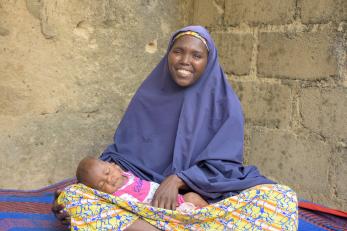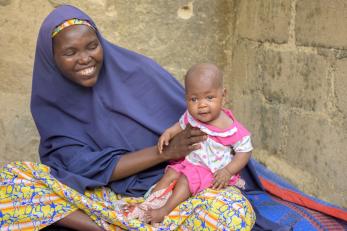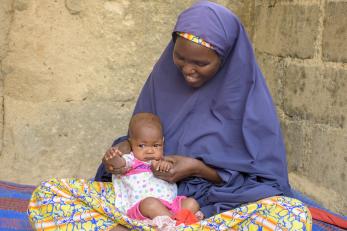Against all odds: A mother's fight for her preterm daughter

Of every 10 babies born, 1 is preterm, and every 40 seconds, 1 of those babies dies, according to a report published by the WHO in 2023. Preterm birth is defined as babies born alive before 37 weeks of pregnancy. Preterm babies require intensive and special care to survive. A luxury that low-income families in northeast Nigeria, a society struggling on two fronts—insecurity and climate change—cannot afford.
Fatima Ali, a resident of Damboa Local Government Area (LGA), received the news of her pregnancy with joy, but that joy was nearly threatened when she entered labor prematurely and gave birth to her daughter after 7 months. In her words, “I was not scared when I had my baby in seven months because caring for preterm babies is one of the topics covered in our nutrition safe space.” Mercy Corps is implementing the Broadening Emergency and Graduation Efforts (BEGE) program in Damboa, and the nutrition component of the USAID-funded program facilitates social and behavioral change by establishing safe spaces where women are taught Infant and Young Child Feeding (IYCF), an initiative Fatima clearly benefits from.

While Fatima was a regular attendee of the safe space sessions, her mother was not, and the duo found themselves on conflicting sides while caring for the baby. “When I told her not to bathe the baby but to use a damp, clean cloth to clean her body, she insisted on bathing her. I had to call my neighbors who also attended the safe space to stop her,” she narrated. This brought about tension between daughter and mother because, according to Fatima’s mother, she is deviating from the way they have always cared for preterm babies.
Fatima was determined for her daughter to live against all odds. Days after giving birth, she wasn’t producing enough milk for the child, and her mother decided to make kunu, a local drink, for the child. Fatima has, however, learned to exclusively breastfeed for the first six months of the child. “I had to take the baby and run to the nutrition-safe space because my mother wouldn’t listen to me and insisted on feeding her kunu,” she narrated. At the safe space, Fatima was counseled further on dietary changes she needed to make to produce more milk, which she followed, and things got better.

Fatima’s daughter Nana is now 7 months old and, to the delight of her mother, is growing stronger and more beautiful each day. “I love my daughter and want to see her grow and become a doctor one day. The way I suffered and risked relationships for her to survive, she better become someone important in life,” Fatima said amidst laughter. Fatima did go against the grain to keep her child, denying visitors the opportunity to carry her when they visit, washing her hands before even touching the child, and giving just breast milk for the first six months. The day Fatima gave birth in the hospital, another woman was there who also had a preterm baby. “Four days after we gave birth, my mother told me the other woman’s baby died, sadly. It was at that point that she started trusting my judgment on how to care for the child.” She narrated.
Fatima is now an ambassador of the safe space program, inviting several women to join and also learn about IYCF. The social and behavioral changes taught in the safe space are slowly permeating the entire community. As evidenced by the testimony of Fatima’s mother, “even though I never attended the IYCF safe space, I feel like I know enough about how to care for infants and teach other women what I know,” she said. As the 2-year BEGE program enters its second year, it is poised to meet its objective of improving the nutritional status of 116,294 conflict-affected girls, boys, and women.
About BEGE
BEGE is a Hausa word for “hope.” The program aims at securing progress in improving human security outcomes in central and southern Borno following 13 years of conflict. BEGE-Borno is a 24-month program funded by USAID’s Bureau for Humanitarian Assistance that aims to save and sustain lives and enhance the adaptation of internally displaced persons and vulnerable host communities to shocks and systemic constraints within Borno State. BEGE works in selected wards in Damboa, Dikwa, Gwoza, Konduga, and Monguno Local Government Areas of Borno State. The program is implemented by Mercy Corps in consortium with the International Rescue Committee (IRC) and has interventions in agriculture, health, nutrition, food assistance, WASH, protection, MPCA, shelter, and settlement.